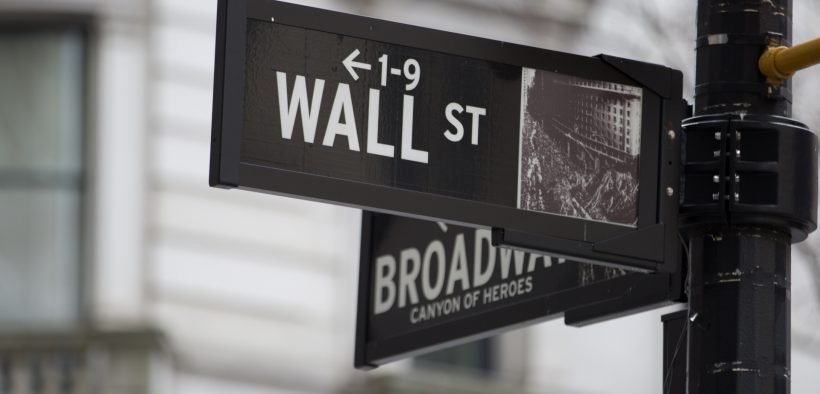Wall Street Picks its Favorite Candidates For 2020

Wall Street will play big in the 2020 election, whether as a financial backer or as a topic of debate.
Joe Biden, Kamala Harris, and Pete Buttigieg have emerged as Wall Street donors’ clear favorites among the 2020 Democratic presidential candidates, with contributions in the year’s second quarter coming from at least 15 top bank executives, according to CNBC.
While the primary is still in its early stages, campaign financing will likely be a polarizing issue among the 2020 hopefuls, as the Democratic base’s leftward shift has sparked intense scrutiny of candidates’ relationships to Wall Street and big business.
Goldman Sachs Influence Abounds
South Bend Mayor Pete Buttigieg led the field in second quarter donations with a $24.8 million haul, having “had some help from Wall Street in hitting that milestone,” as per CNBC. Notably, Buttigieg hired former Goldman Sachs executive Sonal Shah as his national policy director earlier this month.
“Richard Zinman, an executive director at J.P. Morgan, gave Buttigieg $2,000 in late April,” CNBC reported. “James Mahoney, the head of global communications and public policy at Bank of America, gave the same amount to Buttigieg’s 2020 campaign in June.”
Former Vice President Joe Biden raised $21.5 million in the second quarter, with donations from Goldman CFO Stephen Sherr and former Goldman Sachs and Citi CEO Robert Rubin, among others.
Biden has a strong relationship with the banking industry, having been called the “senator from MBNA” for his ties to the credit card company that was bought by Bank of America. Delaware, which Biden represented for over 30 years in the senate, lifted its usury laws in 1980 to attract major banks, who used the states’ lax regulations to bypass other states’ more stringent laws and send out high-interest credit cards throughout the country.
Critics point to decisions like these as contributing to America’s $1 trillion credit card debt burden, with the financial services industry gaining $113 billion last year from American consumers in credit card fees and interest.
Sen. Harris raised nearly $12 million in the second quarter, with Wall Street contributions including a $1,000 donation from Jennifer Scully-Lerner, a vice president at Goldman Sachs, and a $2,800 donation from Ray McGuire, who’s led Citi’s investment banking division for 13 years.
Sen. Kamala Harris claims to have taken on predatory banks during her time as California’s attorney general, but critics question her failure to prosecute current Treasury Secretary Steve Mnuchin, who was called the “foreclosure king” for his time as CEO of mortgage lender OneWest.
In 2012, prosecutors at the California Department of Justice urged Harris to file a civil enforcement action against OneWest, having found the bank responsible for over a thousand violations of foreclosure law and suspecting that further investigation would reveal thousands more, according to an internal memo published by the Intercept.
However, Harris declined to prosecute OneWest or its CEO, Steve Mnuchin, despite her department’s description of “widespread misconduct” at the bank. Harris was also the only Democratic Senate member to receive a donation from Mnuchin in 2016, although she voted against his confirmation as Treasury secretary.
Others criticize Harris’ role in the national mortgage settlement, which bailed out fraudulent mortgage lenders while largely failing to prevent evictions.
Shunning Wall Street
Alternatively, top progressive candidates Elizabeth Warren and Bernie Sanders have shunned Wall Street money and championed structural reform of the finance sector. Warren has issued numerous policy rollouts targeting Wall Street, such as the Stop Wall Street Looting Act, while Sanders has recently pushed bills to cap credit card debt at 15% and tax financial transactions.
Of the two, Wall Street seems to prefer Warren, however, as Sanders holds open disdain for recession-era executives who evaded punishment after the subprime mortgage crisis and celebrates the negative statements made about him by billionaires on his website’s “anti-endorsement list.” Meanwhile, Warren claims she is a “capitalist to my bones” and was a Republican during the Reagan era, leading some analysts to believe she would be less strict than Sanders if elected to office.
“While her presidential campaign publicly rejects big money donations, the presidential campaign squeezes millions of dollars out of Warren’s senate campaign fund–and there are plenty of big fish in there,” wrote Benjamin Studebaker, a Ph.D. candidate at Cambridge who writes a popular blog critical of Democratic candidates’ campaign donations.
Both progressives managed to raise large sums in the second quarter of 2019 without Wall Street, however. Sanders raised $18 million from an average donation of $18 in the second quarter of 2019, while Warren brought in $19 million from an average donation of $28.
















‘Meanwhile, Warren claims she is a “capitalist to my bones” and was a Republican during the Reagan era, leading some analysts to believe she would be less strict than Sanders if elected to office.’
Coming up: another no-good-choice ballot. Sic semper plutocracy.